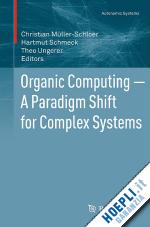
Questo prodotto usufruisce delle SPEDIZIONI GRATIS
selezionando l'opzione Corriere Veloce in fase di ordine.
Pagabile anche con Carta della cultura giovani e del merito, 18App Bonus Cultura e Carta del Docente
Organic Computing has emerged as a challenging vision for future information processing systems. Its basis is the insight that we will increasingly be surrounded by and depend on large collections of autonomous systems, which are equipped with sensors and actuators, aware of their environment, communicating freely, and organising themselves in order to perform actions and services required by the users.
These networks of intelligent systems surrounding us open fascinating ap-plication areas and at the same time bear the problem of their controllability. Hence, we have to construct such systems as robust, safe, flexible, and trustworthy as possible. In particular, a strong orientation towards human needs as opposed to a pure implementation of the tech-nologically possible seems absolutely central. The technical systems, which can achieve these goals will have to exhibit life-like or "organic" properties. "Organic Computing Systems" adapt dynamically to their current environmental conditions. In order to cope with unexpected or undesired events they are self-organising, self-configuring, self-optimising, self-healing, self-protecting, self-explaining, and context-aware, while offering complementary interfaces for higher-level directives with respect to the desired behaviour. First steps towards adaptive and self-organising computer systems are being undertaken. Adaptivity, reconfigurability, emergence of new properties, and self-organisation are hot top-ics in a variety of research groups worldwide.
This book summarises the results of a 6-year priority research program (SPP) of the German Research Foundation (DFG) addressing these fundamental challenges in the design of Organic Computing systems. It presents and discusses the theoretical foundations of Organic Computing, basic methods and tools, learningtechniques used in this context, architectural patterns and many applications. The final outlook shows that in the mean-time Organic Computing ideas have spawned a variety of promising new projects.











Il sito utilizza cookie ed altri strumenti di tracciamento che raccolgono informazioni dal dispositivo dell’utente. Oltre ai cookie tecnici ed analitici aggregati, strettamente necessari per il funzionamento di questo sito web, previo consenso dell’utente possono essere installati cookie di profilazione e marketing e cookie dei social media. Cliccando su “Accetto tutti i cookie” saranno attivate tutte le categorie di cookie. Per accettare solo deterninate categorie di cookie, cliccare invece su “Impostazioni cookie”. Chiudendo il banner o continuando a navigare saranno installati solo cookie tecnici. Per maggiori dettagli, consultare la Cookie Policy.